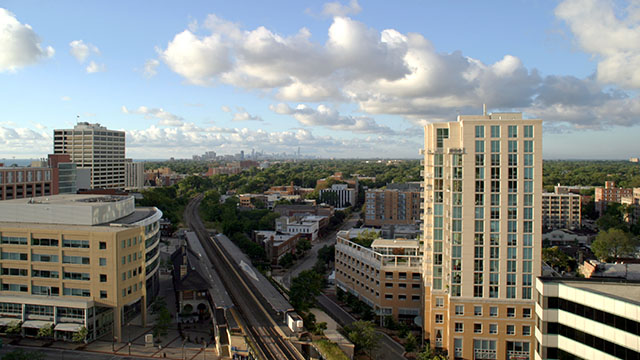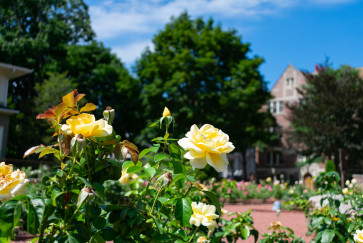Northwestern University and the City of Evanston announced today (July 29) that Northwestern will contribute $1 million to the City for a sixth year, and is expanding its commitment with the creation of a new $500,000 community engagement grant program aimed at working with Evanston and Chicago to advance racial equity and social justice.
Northwestern President Morton Schapiro and Evanston Mayor Stephen Hagerty unveiled the Northwestern Good Neighbor Racial Equity Fund that builds on the University’s Good Neighbor Fund. The City and the University have agreed that the new fund will invest this year’s $1 million gift in programs that dismantle systemic barriers faced by historically marginalized communities in Evanston.
The President and the Mayor also announced that the University will increase this commitment by creating the Racial Equity and Community Partnership grants program with an additional $500,000. This innovative pilot program will be administered by the Office of Neighborhood and Community Relations at Northwestern. Grants will be awarded to partnerships between community-based nonprofits or groups in Evanston and Chicago, and Northwestern faculty, students or staff.
The new fund and community grants are part of the commitment President Schapiro and senior University leaders announced June 14 to allocate $1.5 million in the fiscal year starting Sept. 1 to Evanston and Chicago to advance social justice and racial equity. This plan shifts the focus of Northwestern’s Good Neighbor Fund program that has provided $1 million a year to the City of Evanston for programs, positions and infrastructure projects in the City in each of the last five years. Similar to the initial Good Neighbor Fund, allocation of the Good Neighbor Racial Equity Fund will be agreed upon jointly by Evanston’s mayor and Northwestern’s President.
“As Northwestern’s Evanston and Chicago homes continue to grapple with two historic challenges, COVID-19 and systemic racism, the University is in a position to help lead the way in finding a solution, and it has a duty to do so,” President Schapiro said. “As part of our efforts to strengthen our communities, Northwestern is increasing our commitments in Evanston and Chicago.”
As Northwestern’s Evanston and Chicago homes continue to grapple with two historic challenges, COVID-19 and systemic racism, the University is in a position to help lead the way in finding a solution, and it has a duty to do so.”
“Advancing racial equity and eliminating the social and economic disparities that have been present in our city for decades requires a communitywide commitment,” Mayor Hagerty said. “The Good Neighbor Racial Equity Fund will allow the City of Evanston to build on our efforts to eradicate systemic racism, remove barriers for marginalized communities, and further invest in programs that uplift our entire City. I want to thank Northwestern for partnering with us in this critical work.”
Dave Davis, executive director of the University’s Office of Neighborhood and Community Relations, said Northwestern’s sixth annual donation of $1 million to the City will go this coming year to help Evanston improve outcomes for people of color in four priority areas.
“At this historic moment in our nation, as Americans across the country fight to ensure that Black Lives Matter, these priority areas are focused around measurable community indicators and a racial equity-driven policy process that centers the experiences and voices of those who are most affected,” Davis said. Specific allocations will be determined this fall, and Davis listed the four priority areas, determined in collaboration with the City, as:
- Economic Opportunity: With a focus on business development, employment, income and poverty
- Justice and Government: With a focus on civic life and engagement, recidivism, law enforcement and victimization
- Neighborhoods and Infrastructure: With a focus on access to housing, housing affordability and services, neighborhoods and transportation
- Public Health: With a focus on population health, mental health and health risk factors
In addition to the annual donation, the University is increasing its commitment by creating the $500,000 Northwestern Community Engagement Grant program involving collaborations between Northwestern community members and groups in Evanston and Chicago. These partnerships will pilot ideas and programs that could advance research-based knowledge, address local issues and be leveraged for broader impact by securing additional foundation and government support.
These community engagement grants will add new initiatives to a number of University and community partnerships that are already helping Evanston school children and small businesses — projects that exemplify these types of deep commitments that advance Northwestern’s mission while also moving the needle on some of the most critical community issues.
This Northwestern Community Engagement Grant program will include:
- A commitment of $500,000 for partnerships that foster research and scholarship relevant to the local community and addresses critical community issues rooted in racial equity and social justice.
- An advisory committee made up of Northwestern representatives, City officials, and community members that will be formed in August and develop the program structure and community engagement process.
- Grants ranging from $25,000 to $75,000 that encourage innovation and focus on specific areas: public safety, health disparities, youth, education, housing, the justice system and incarceration.
In September and October, the advisory committee will meet to determine funding priorities, guidelines and a calendar of next steps in the process, as well as develop mechanisms to facilitate Northwestern faculty, student and staff connections with community-based nonprofits and groups.
A grant website will be launched in November, when officials will announce funding priorities and make applications available. These applications will be due by January, when the committee will review them and recommend to senior leadership which ones should be awarded funding.
More information on the process, the guidelines for applying and other details will be announced in the fall. For preliminary details on the process and who should apply, visit Northwestern’s Neighborhood and Community Relations website.


